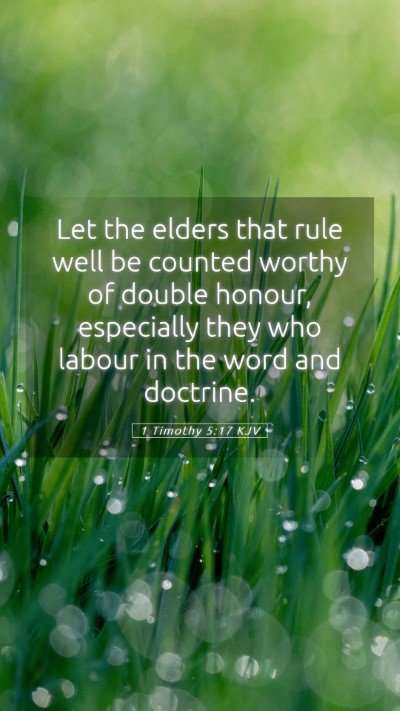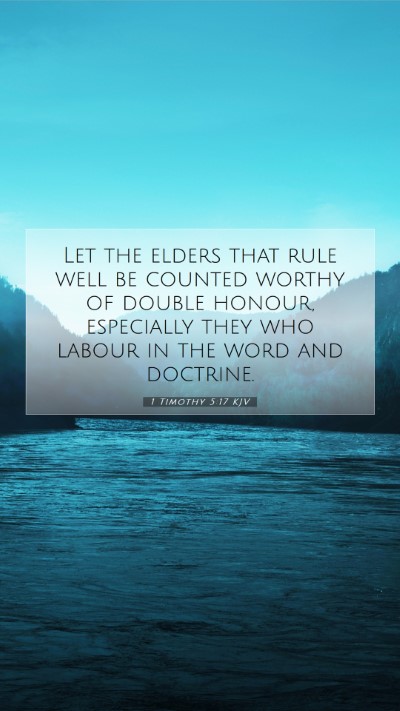Understanding 1 Timothy 5:17
Bible Verse: 1 Timothy 5:17 - "Let the elders that rule well be counted worthy of double honour, especially they who labour in the word and doctrine."
Bible Verse Meanings
This verse addresses the treatment and recognition of church leaders, particularly elders. The Apostle Paul instructs believers to honor those elders who lead effectively and engage diligently in teaching and preaching. The phrase "double honour" suggests a recognition that goes beyond mere respect, indicating a commendation that may also involve financial support.
Bible Verse Interpretations
- Matthew Henry: Henry emphasizes the importance of acknowledging the efforts of church leaders who are dedicated to the ministry and who provide spiritual guidance to their congregations. He discusses the need for respect towards those who work hard in teaching the Word.
- Albert Barnes: Barnes indicates that this verse highlights the church's responsibility in supporting its leaders, particularly those who have devoted themselves to teaching and spreading doctrine. He notes that financial remuneration may be implied by the term "double honour."
- Adam Clarke: Clarke elaborates that this instruction counters the notion of neglecting leadership. He stresses that a proper structure of honor and support for church leaders is integral to a healthy church community, ensuring that those who labor spiritually are compensated and respected.
Key Insights
This verse encapsulates critical concepts regarding leadership within the church and its relationship with congregants:
- Leadership Roles: The elders referred to here are spiritual leaders tasked with teaching and governing. Their role is vital for the church's growth and well-being.
- Respect and Honor: The directive to offer "double honour" signifies that church leaders deserve respect not only for their position but also for their hard work and sacrifices in ministry.
- Support for Ministry: The intention to support those in leadership financially is underscored in this passage, reinforcing the idea that those who dedicate their lives to spiritual work should be adequately cared for.
Application of 1 Timothy 5:17
Applying this verse to daily life involves recognizing and appreciating spiritual leaders. Congregants are encouraged to actively support their leaders through honor, respect, and practical assistance, whether it be through prayer, encouragement, or financial support.
Historical Context of 1 Timothy
The context of Paul's letters, particularly 1 Timothy, involves addressing issues within the early church regarding leadership, false teachings, and proper conduct. Paul provides Timothy guidance on how to manage these issues, ensuring that the church operates smoothly and honors those who serve faithfully.
Related Bible Cross References
- 1 Thessalonians 5:12-13 - Emphasizes respect for church leaders.
- Hebrews 13:17 - Encourages obedience and submission to leaders who watch over souls.
- 1 Peter 5:2-3 - Advises elders to shepherd willingly and eagerly, not for dishonest gain.
Conclusion
1 Timothy 5:17 serves as a vital scripture that provides insight into the importance of recognizing and supporting church leaders. Understanding Scripture through this verse deepens our appreciation for those who dedicate their lives to guiding others in faith. By honoring those who preach and teach, we uphold a principle central to the Christian community's health and vigor.
Additional Resources
- Bible Study Insights: Engaging with this scripture within Bible study groups can offer fresh perspectives on church leadership and support.
- Online Bible Study: Utilize online platforms to discuss the significance of church leadership in contemporary contexts.
- Bible Study Guides: Look for materials that focus on church governance and the roles of leaders.


